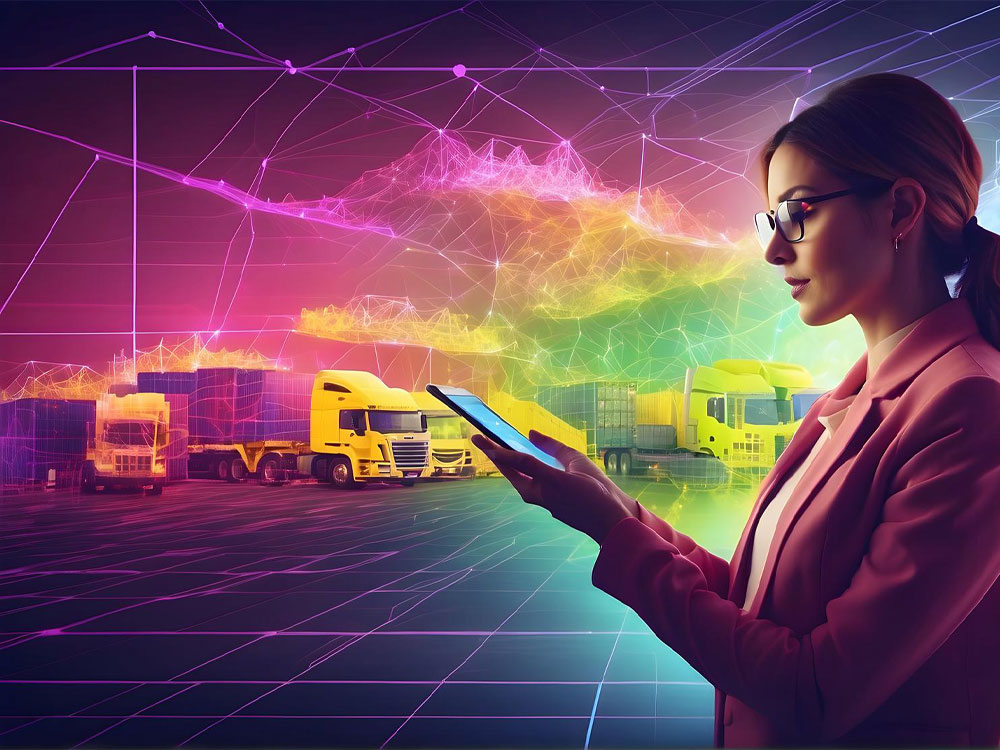According to the World Trade Organization, international commerce is growing 45 times today compared to the early days of trade. Handling these cargo flows is becoming challenging with the increasing number.
The logistics and transport industry, once part of the traditional commerce system, is experiencing a massive transformation, all because of artificial intelligence. This technological advancement focuses on improving customer experience and making operations hassle-free.
In this digital era, organizations opt for new solutions to save time and resources and provide the best possible service to their clients. Logistics is a key element in this.
To cater to such challenges, let's dive deep into numerous ways via which AI is changing the logistics and transport landscape to enhance overall customer experience:
1. Predictive Analysis
Due to increased demand, businesses may experience gaps in the supply chain, which may impact the outcomes. However, it isn’t possible to scrutinize every bottleneck, particularly when you are expanding operations to a larger scale. More resources, in terms of time and people, are required to conduct a constructive analysis.
This is where AI models come to rescue the businesses.
- AI models have the ability to carry out data analysis across several time intervals and levels. And this is not just restricted to data collection.
- These models are capable of reviewing big data volumes to make their predictions and conclusions properly.

2. Improved Visibility and Real-Time Tracking
One of the significant perks of AI in logistics is to work on providing real-time visibility of the overall supply chain. AI-powered tracking systems can track the shipments from the starting point of leaving the warehouse to the time when they’ve reached the customer’s doorstep. This tracking intensity helps customers:
- By providing updates with accurate delivery ETAs.
- They can monitor their package’s journey.
- Be aware of any sudden changes that may happen during the journey like weather conditions etc.
Also, explore the benefits real-time tracking here: Digital Disruption in Logistics: Data Visualization in Fleet Ops
3. Better Route Optimization for Faster Deliveries
AI-powered route optimization systems have algorithms that work on transforming the process of planning and executing the deliveries. By analyzing factors such as road closures, traffic conditions, and delivery windows, these algorithms come up with efficient routes for each delivery. This results in:
- A more reliable and speedy service.
- Reduced fuel consumption and emissions along with ensuring timely delivery.
- Better contribution towards a sustainable future.

4. Tailored Customer Experiences
AI facilitates logistics companies to offer tailored customer experiences. This is done by examining customer data, like purchase history, location, preferences, etc., via which companies personalize their services to cater to individual needs. These customized offerings can be in specific delivery locations or windows.
Moreover, AI-powered chatbots offer instant customer support like:
- Sorting customer issues,
- Responding to queries, and
- Offering tailored recommendations.
5. Automated Warehousing and Inventory Management
AI-powered automation in warehouse management plays a significant role in improving accuracy and efficiency. For instance:
- AI-powered robots perform tasks like packing, picking, and sorting, which reduces labor costs to a great level and minimizes errors.
- An AI-driven inventory management system prevents overstocking and stockouts via optimization of stock levels.
The main aim of this approach is to ensure that customers receive their orders accurately and on time.
6. AI-powered E-commerce Demand forecasting
Such demand forecasting systems can assist e-commerce ventures to execute better sales predictions and improve inventory levels, resulting in improved customer satisfaction and supply chain processes.
With the help of data analysis from various sources, such as social media activity, historical sales data, and market trends AI can:
- Work on providing better predictions of future demand.
- It can also assist in identifying trends and patterns of customer behavior,
- These trends which can further adjust the marketing strategies and product offerings to cater to customer demand.
7. Better-quality Customer Support through AI-Powered Chatbots
AI-powered chatbots respond to FAQs, assist customers with real-time updates on shipments, and also with order tracking. By automating such mundane tasks, chatbots provide human agents with plenty of time to deal with complex issues, leading to a quick response time and better-quality customer satisfaction.
8. Enhanced Security and Fraud Prevention
AI-driven security systems assist in preventing fraud and protecting shipments. By examining data from numerous sources, like video surveillance, sensor data, and shipping records, AI algorithms can screen out suspicious activity and warn security personnel. Few aspects include:
- Intelligent Security Systems: AI-driven security systems can easily detect and solve security breaches including tampering with shipments or unauthorized access to facilities.
- Fraud Detection and Prevention: It examines large datasets to detect fraudulent activities like stolen goods, fake claims, insurance fraud etc, and can take appropriate measures to prevent losses.
Due to this proactive approach, goods are protected and customers receive their orders without any damage.
Challenges and Future Outlook
While we have seen the potential AI has in improving customer experience in the field of logistics, there are challenges involved. These challenges are in the form of potential job displacements, data privacy issues, and the need for skilled AI experts. However, with the evolvement of technology over time, it will become more integrated into the logistics and transport industry, providing more innovation and customer satisfaction.
From predictive analytics to improved customer support and tailored experiences, AI is altering the way goods are moved across the world. By embracing AI-powered systems, logistics companies can stay ahead of the competition, offer incredible customer experience, and flourish in this digital age
.png)








